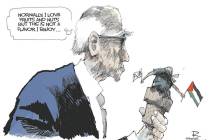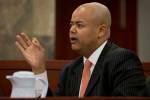EDITORIAL: Federal court secrecy goes too far
The federal government stomps all over Americans’ rights on a regular basis. But when the government uses the courts — the system that is supposed to provide the final check on government overreach — to trample our liberties, it’s beyond outrageous. It’s a constitutional crisis.
Fortunately, one federal judge has called out government prosecutors for using their frightening powers to loot a Las Vegas gambler and his family, and complete the entire shakedown in secret.
The country needs more judges to follow his lead.
The entire ordeal was reported Sunday by the Review-Journal’s Jeff German. After more than a decade of investigation, federal agents in December raided the home of Glen Cobb and seized $2.7 million from two safes. The government also took $10.5 million from the investment and bank accounts of Mr. Cobb, his stepdaughter and his 82-year-old parents, even though search warrants authorized by U.S. Magistrate Judge Cam Ferenbach allowed agents to take just $4 million.
When the family’s lawyers demanded the assets be returned, the government sought civil forfeiture under “super seal.” Widely abused forfeiture laws allow governments to keep assets they believe were obtained through criminal means, even if no criminal charges are ever filed. And under “super seal,” cases and their documents are stored in a court vault, not loaded into a digital case management system. The Cobbs themselves couldn’t even review the case against them.
It wasn’t until June that prosecutors charged the Cobbs with running an illegal bookmaking operation and hiding assets from the IRS. The criminal case ended the asset forfeiture proceedings and finally made much of the case public. And in a May 15 decision unsealed earlier this month, Judge Ferenbach blasted federal prosecutors’ treatment of the case.
“Relying on various sealed and super-sealed filings, the government asks the court to rule against private citizens, allow the deprivation of their property and deny them a process to redress possible violations of their constitutional rights through a secret government action that provides no notice or opportunity to be heard,” the judge wrote. “Saying that this would offend the Constitution is an understatement. It is constitutionally abhorrent.”
The justice system’s integrity is rooted in open proceedings and due process. When the government provides citizens with neither, there is no justice.
“It seems to be right on the edge of presenting a false docket of your court work to the people,” Gregg Leslie, legal defense director for the Washington-based Reporters Committee for Freedom of the Press, told Mr. German. “If they’re saying, ‘Here’s everything we’re working on,’ and it turns out they’re hiding things, then that’s a serious problem.”
The Cobb case posed no threat to public safety or national security. Prosecutors abused the sealing process simply because they could.
Asset forfeiture laws have long been in need of reform. That’s up to Congress and state lawmakers.
But federal judges must not allow U.S. attorneys to keep federal cases in the shadows. It’s up to the bench to hold the government accountable to the court, the people and the Constitution.























